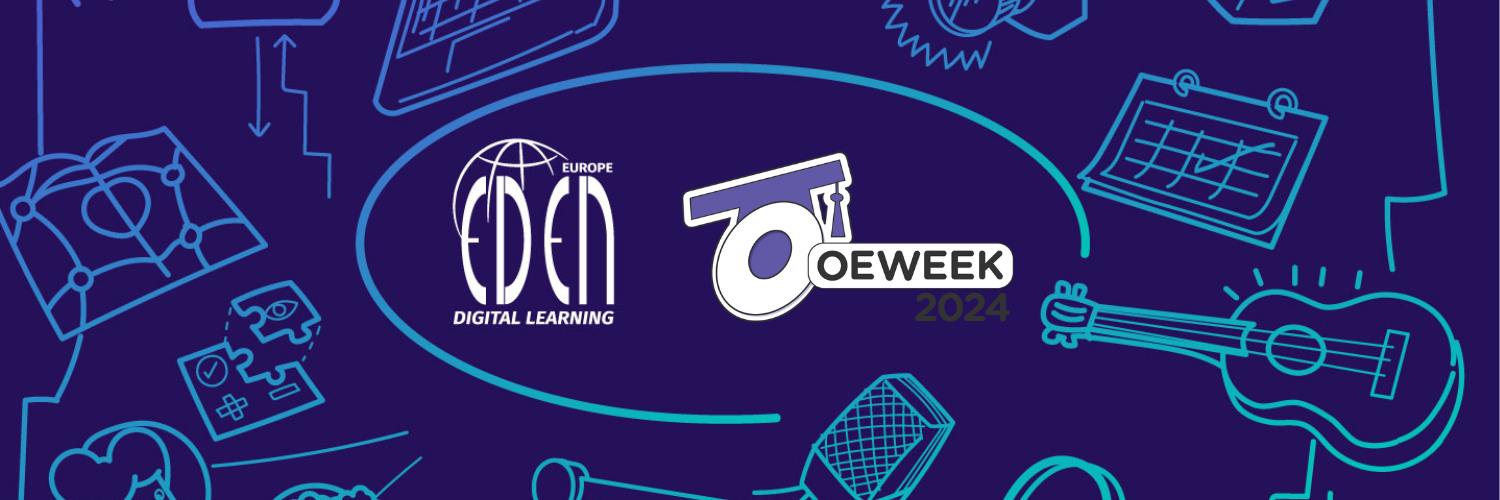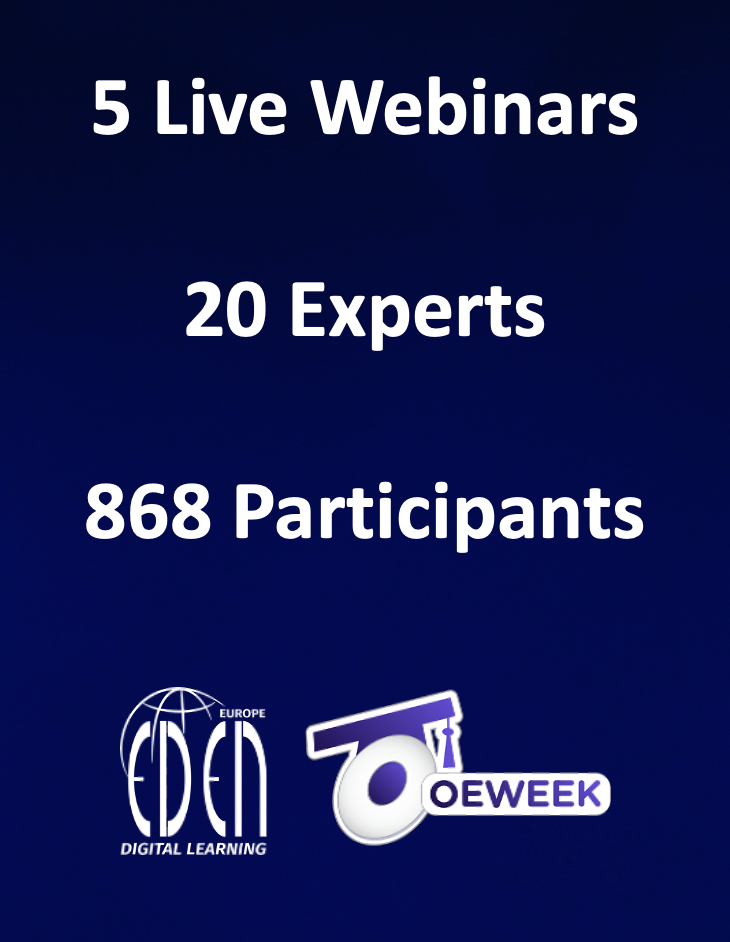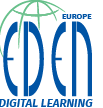
Open Education Week 2024, 4-7 March – Conclusions
Open Education Week is a celebration of the global Open Education Movement. Its goal is to raise awareness about the movement and its impact on teaching and learning worldwide, the free and open educational opportunities that exist for everyone, everywhere, right now.
EDEN is endorsing the Open Education Week for the 8th year now organizing EDEN DLE OEW. We want to highlight how open education can help people meet their goals in education, whether that’s to develop skills and knowledge for work, supporting formal studies, learning something new for personal interest, or looking for additional teaching resources.

During the Open Education Week, EDEN DLE offered the following online events. Click on each event page to find the recording of the session:
Description: The panel will discuss the potential role and impact of artificial intelligence in both formal and informal educational contexts, highlighting the ethical implications and possibilities in terms of promoting the social and cultural inclusion of different categories of learners, such as those with protected characteristics (such as disability). In the panel, experts will present case studies, research experiences and good practices implemented in different educational institutions, from primary schools to heritage institutions. Find more information about the event, here.
Moderator: Antonella Poce
Speakers: David Guralnick, Deborah Seid Howes, Emily Kate Genatowski, Maria Rosaria Re and Carlo De Medio
Description: Remote access to educational resources and opportunities for study or professional development increasingly depend on continuous access to technology, particularly smartphones and other mobile devices. Many people find themselves excluded, due to limited personal and local resources as well as multiple forms of marginalisation. In this session we present experiences and research findings from recent funded projects in low resource settings in several countries, with a special focus on Asia and Africa. The common theme in these projects has been a focus on marginalised or resource-constrained educators and students, including refugees and those who are from marginalised minority ethnic backgrounds. We draw attention to the aspirations and motivations of our research participants in their education contexts and share important insights into their experiences with technology. Find more information about the event, here.
Moderator: Denise Whitelock
Speakers: Agnes Kukulska-Hulme, Koula Charitonos, Saraswati Dawadi and Tom Power
Description: “AIComp – Future Skills for a Life World Shaped by AI” marks a pioneering endeavor in the realm of educational and professional development. It is developed through the NextEducation Research Group and presents the most comprehensive study to date on the subject. It sheds light on the evolving requirements that professionals face in both their careers and personal lives in an era increasingly influenced by artificial intelligence.
This groundbreaking study stands out as the first to adopt a fully action-competence-oriented approach, reconstructing an empirical competency model directly from the data gathered from over 1,600 professionals. The European skill model AIComp (Artificial Intelligence Competences) was meticulously developed through the collaborative efforts of the AI-Campus and AI-Campus Hub projects, alongside with 13 partners from education, research and industry.
By delving into the competency needs that emerge as AI becomes more integral to our professional and personal spheres, AIComp offers invaluable insights into preparing for a future where artificial intelligence shapes significant aspects of our existence. This study not only maps out the terrain of future skills but also pioneers a methodological approach that promises to influence how we understand and respond to the demands of a world transformed by AI. Find more about the event, here.
Moderator: Emily Rauch
Speakers: Ulf-Daniel Ehlers
Description: Join us for this insightful webinar, where we bring together three international experts in educational technologies, digital assessment, and artificial intelligence. In the age of GenAI, understanding its impact on learners’ assessment is very important. This event aims to provide educators with insights into redesigning digital assessment strategies to meet the challenges and potential posed by GenAI. Also, AI-specific competencies, defined within the AI Pioneers project, will be introduced as part of the supplement of the DigCompEdu framework. Find more information about the event, here.
Moderator: Giedrė Tamoliūnė
Speakers: Graham Atwell, Orna Farrell and George Bekiaridis
Description: GenAIs play a crucial role in Open Educational Resources (OER) by improving the accessibility, equity, inclusivity and effectiveness of teaching and learning materials. Through advanced natural language processing and personalised learning algorithms, GenAIs can tailor content to the individual needs of learners, promoting a more adaptive and engaging educational experience. In addition, they contribute to the creation of high-quality OER by generating educational content, assessments and interactive resources, expanding the availability of diverse and innovative educational materials. Accordingly, it is important to take the lead in the AI era. Join us in this session organised in collaboration with ICDE, OER Advocacy Committee and discuss with experts on the topic of GenAI, OER and high-quality teaching and learning in the digital age. Find more information about the event, here.
Moderator: Sandra Kučina Softić
Speakers: Ebba Ossiannilsson, Gila Kurtz, Rosa Leonor Ulloa Cazarez and Ilona Buchem
